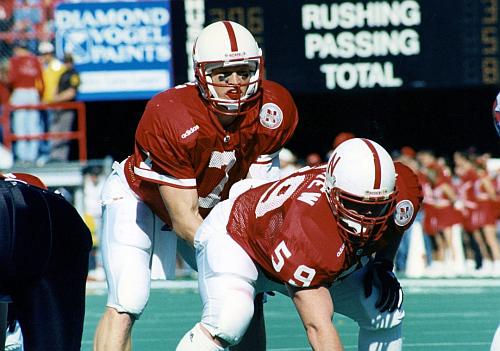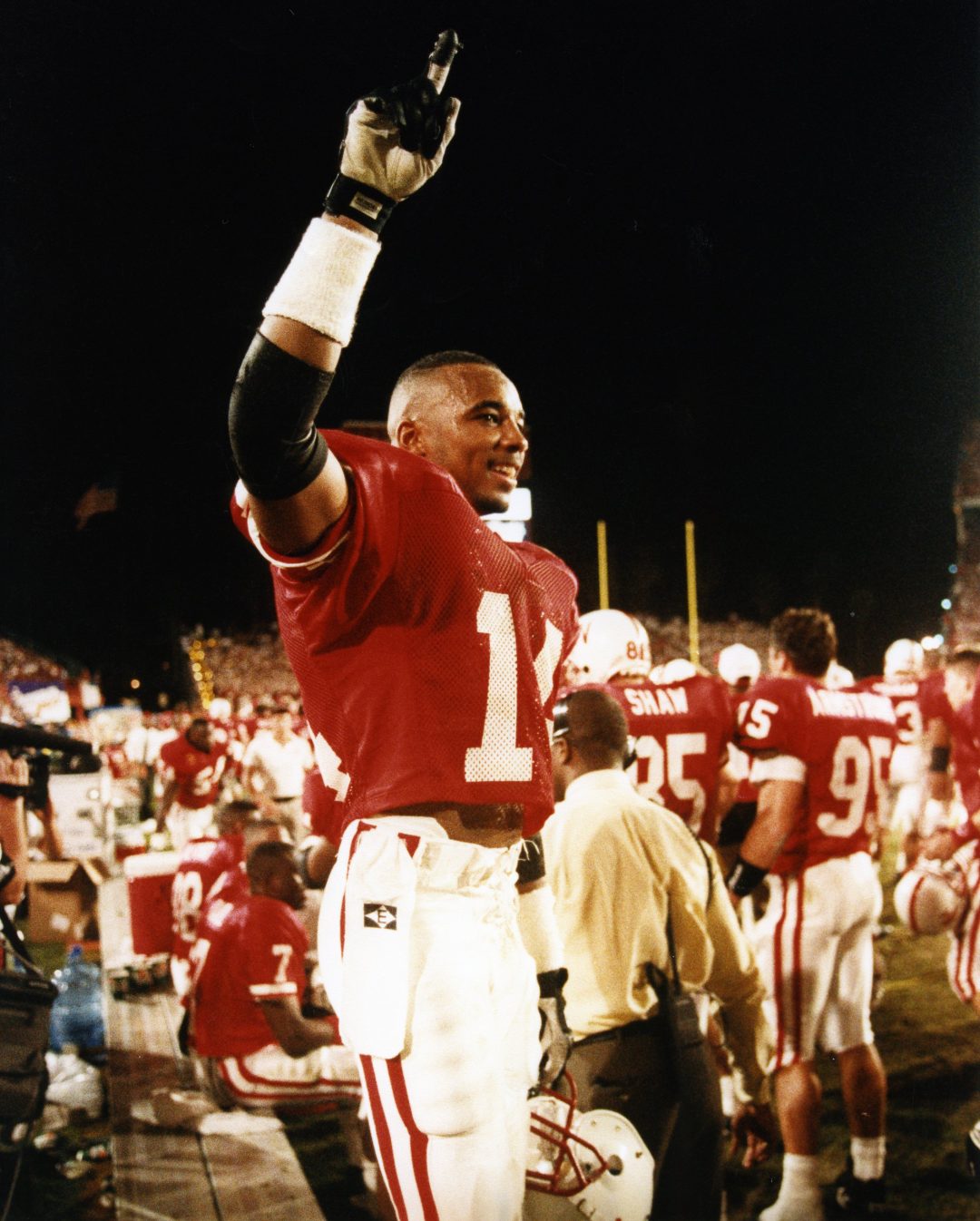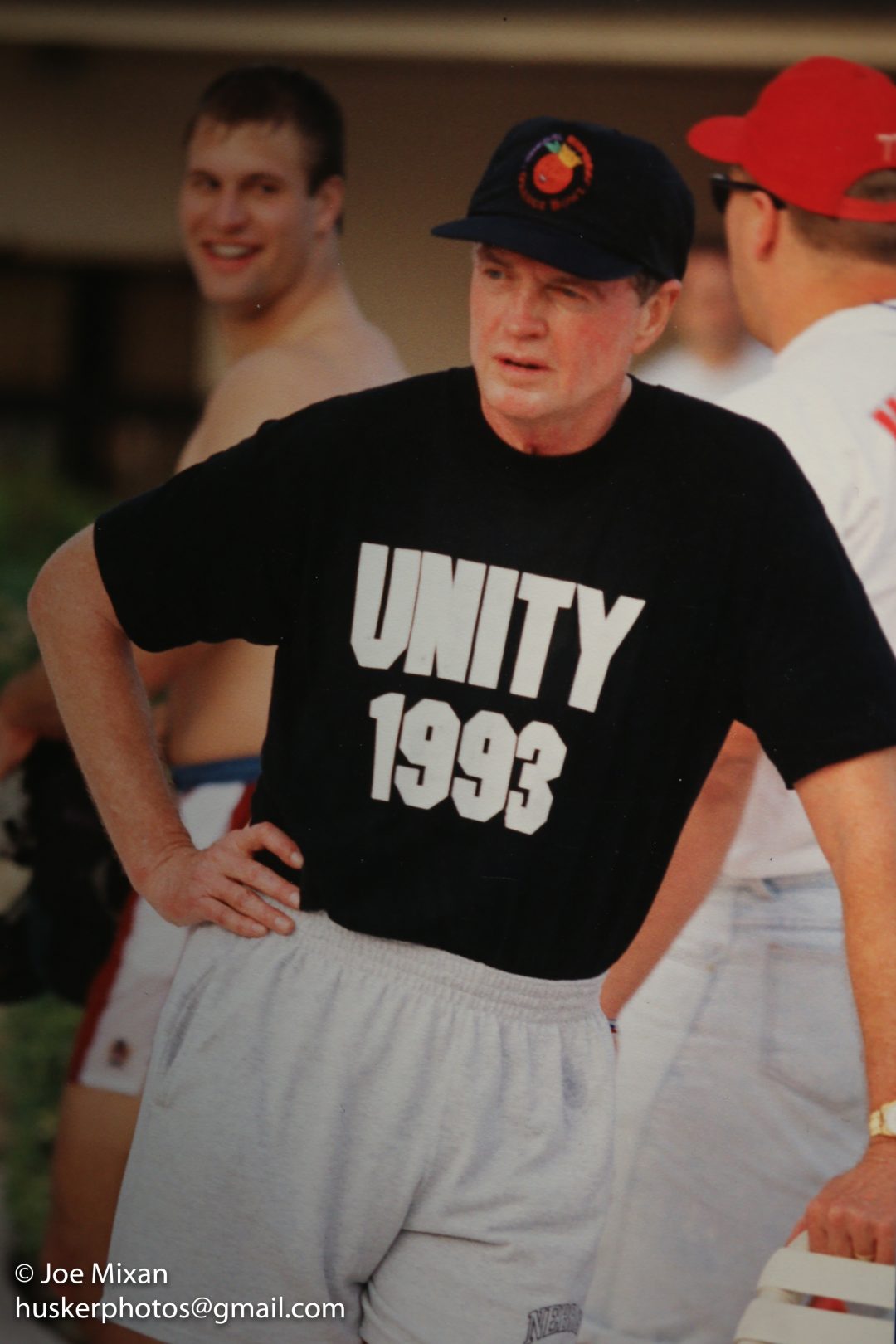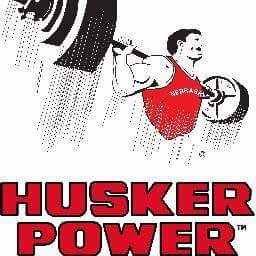Anatomy of an Era: Curt Thompson, Strength Coach/Football Ops, Part 2

Excerpted from Chapter 33, No Place Like Nebraska: Anatomy of an Era, Vol. 1 by Paul Koch
Curt Thompson, Part 2
Q: What was the biggest challenge for you in doing your job?
CT: Recruiting changes. You know, I’d have stuff set up and Saturday morning would come and they’d want to change something, wanted to give a recruit some extra sleep because he was coming in from Hawaii, having to redo his schedule so he’d fit in with other guys visiting. Toniu Fonoti and guys like that.
Q: Were there any quirky assignments or strange things about the job?
CT: You know, one of the things that stands out, we were down in Kansas for a night game and we had a shoe contract with adidas. And for pregame warmups Coach Osborne had a red jacket on, and it was last year’s team jacket. So they do the pregame warm-ups and they’re coming in before the game and doing their last-minute deals and Coach Osborne’s talking to them, and the adidas rep and Pat both want me to go up to Coach Osborne and ask him to switch his raincoat to this year’s model. And I was, ‘Oh man, you’ve got to be kidding me.’ So I went up to Coach and asked him to change his rain jacket. And he was very cordial, and he did.
And another quirky thing that I just hated doing was that Tunnel Walk. I just hated it. They wanted it so they’d play the tunnel music and then when you get to the point when you’d see the doors open the team was in the tunnel and they’d start to walk out. And that was like 60 seconds or so after the tunnel walk music and video starts. So you’d have to time that, because you never wanted it where the door would open up and have the tunnel empty. So I had to start this Tunnel Walk while the players are still in there with the captains talking and when they say that pregame prayer. (And you never know how long those captains are going to talk.) So you have to guess on when the captains are going to be done and finish with their prayer and tell Jeff Schmall in Husker Vision to start the music, and hoping they’ll be done in a minute.
And if they’d come out there early, then you’d have to tell them to wait. If it’s a big game, everybody’s ready to go, ‘Wait ten more seconds! Ten more seconds!’ They’re ready to rip off some heads and you have to tell them to wait ten seconds.
Q: How long did you do that?
CT: That was from ’97 to 2000. I left right before the season, August of 2001.
Q: I would suppose every year you got a little better at guessing when it was gonna go down?
CT: Yeah, a little bit better. But then again, they changed the thing around every year, so it was always exciting to deal with. Those are the quirky things. Home football Saturdays are always nice, but you’re like, ‘Arrgh, I just hate that part!’ Everything after that was great, but you wake up football Saturday and you’re just dreading that. I hated the Tunnel Walk. That was stressful for me.
Q: (laughs) I’ve heard there are some businessmen who start every day at their desk by bringing up YouTube to get ‘psyched up’ for the day with the Tunnel Walk…
CT: Well, good….. (laughs)
Q: When you were coaching, wasn’t each strength coach overseeing a certain segment of the team? His own group of guys?
CT: Yeah, mine was the defensive backs. And I didn’t get to work with Coach Darlington a whole lot, because during winter conditioning they could only be there for just a little bit, at that point in time. It was toward the end where they could do some specific drills, and during the summertime they couldn‘t be there at all. I think before the winter conditioning started we might have gone and talked to the coaches and seen what his ideas for each guy where, what they needed to improve on or concentrate on.

Both volumes available on Amazon.com
Q: What names stand out to you from those days, those groups?
CT: Barron Miles, he stands out. Such a great guy, hard worker. Great leader. Wasn’t very vocal.
And you know what, a lot of those guys weren’t very vocal. Sure, you had the Peter brothers, but so many of the guys just did it instead of talking about it. Tyrone Williams, he was a decent worker, a pretty good worker. He’d do a drill, if he was supposed to run 40 yards in the summer he might run 30. He was really gifted. Mike Minter, he was a great leader of that group and worked hard. Just work ethic, leading by example, he’d run the full 40 yards. Eric Warfield was very talented. When he ran he was just fluid when he moved, effortless. Wistrom and Peter, also, they didn’t have a lot of talk and cockiness, but they had a swagger and confidence. That was the difference. Not just a lot of talk, but they challenged everybody else to pick it up a notch by their efforts.
Q: You were on the coaching staff of what many consider to be the greatest college football team of all time. What, more than anything, stands out to you about those teams of that era?
CT: You know, I think that those ’94 and ’95 teams, the things that stand out are Tommie Frazier and Brook Berringer. Tommie was just a great option quarterback and great athlete, I don’t think we would have won those national championships without him. On the other hand, Brook was just as talented a quarterback, but a different type of quarterback. And those two guys got along so well in my view, you didn’t hear of any animosity between those two guys, and especially with Brook. He could’ve been upset. Especially nowadays, if you’re not the starter the players want to take off and leave the place to be the starter elsewhere, be the man. But at that time you never heard him talk to the press of him being the starter, about how he should be number one. I think that team, a big part of that team there was not feuding about that position. And that was a pretty important position. Everybody knows those two were the best guys and they were neck and neck. They did the same things but they did them differently, and you saw it the previous year in the Orange Bowl.

Orange Bowl, Barron Miles (Unknown source)
Q: Miami had to practice for two quarterbacks…
CT: And they both did well. In ’95 the work ethic, all those guys, the defense, the Blackshirts, it kind of started in the ’93 Orange Bowl with 1:16, and during that summer conditioning was where it started. On days before summer conditioning, Randy Gobel and I would go up to the scoreboard and we’d start the music. They’d have music playing during the workouts, any old music -and we didn’t do it a lot- but he’d put the music on those new speakers and he put 1:16 on the scoreboard in summer conditioning before that ’94 season as a reminder. And they got a taste of it in ’94 when we won, and it just carried over to ’95.
Q: Anything stand out to you as far as a change in the attitude, a change in the mindset among the players?
CT: I know that the Citrus Bowl wasn’t a whole lot of fun. I wasn’t at it but I watched it on TV, where we got it handed to us. Then the next year we went to the Orange Bowl and got beat like 22-0 and that wasn’t a whole lot of fun, either. I was pretty new back in ’91 and didn’t know what kind of work ethic those guys had -are they big and slow or lean and fast?- but it seemed when I went over to West Stadium that year everybody had those black t-shirts with white letters that said ‘UNITY’ on them. And it seemed we really focused more on hang cleans and power cleans and those stupid snatch squats, and got all those power racks. We really taught that hang clean where we were trying to become a little more explosive and quicker. So I guess in that strength part of it we were developing more explosiveness.

Tom Osborne and the Unity theme. (Joe Mixan)
It seemed like John Parrella and Kevin Raemakers were always in there, those guys were constantly in there, and then Christian Peter came in and Jason did, and Grant, so there was a pretty good succession of, “This is the way we do it,” and it got passed down through them. Because Parrella and Raemakers, they didn’t let guys slide, they were leaders off the field. Terry Connealy was. Terry was the nicest guy you could see off the field, but a soon as he was on the field you wouldn’t want to be near him. He was a monster. And the Peter brothers, they’d make everybody accountable, it didn’t matter if it was offense or defense.
In the weight room, you could really see those guys’ leadership during that Metabolic Power Circuit. I mean, that thing was tough. And you’d get sick if you did it correctly, that thing was tough. I don’t know how many times I’d get sick and throw up, just puke. I remember going back into the kitchen and feeling like absolute crap, then you’d throw up and finally feel great. I mean, those guys are out there in the middle of the workout, in between sets, and we had trash cans all around that thing because guys were puking. Now, some were out of shape, but some of it was because guys were pushing everybody so hard. Just working hard. That thing kicked everybody’s ass. I don’t know, do they still do that?
Q: I don’t know. I still do.
CT: You do? I did it about a year ago for a little bit. It’s just the intensity. You know, when you see your leaders doing that? Your captains pushing themselves that hard? It rubs off on the younger guys. Leading by example…
Q: Any thoughts of Coach Osborne?
CT: Very calm, cool, collected. Respected. You can just see that. I think everybody worked so hard because everybody respected him so much, because of his knowledge, his demeanor, how he treated everyone. He treated everyone fairly.
The coaches had respect for him. They’d put in so much time, even with their families. I think they did that out of respect for him. Players had tremendous respect for him. And many of them came to Nebraska because they wanted to play for him. He had a stature to him. I’m having a hard time describing him, but you’re in awe of him when you see him just because you know of the accomplishments that he had at the time.
Q: Any other staff members stand out to you?
CT: I guess I’ve got two. Coach McBride, he could get his defensive players to run through fire for him, the same way. Those guys respected him and they’d do anything for him. That was Charlie. I got along well with Charlie. I still get a Christmas card from Charlie, down in Arizona. But he would, especially when you talk to him one on one, it seems like he really cared, he really did. He wanted to know what you were feeling, what you were saying. He just wasn’t trying to get you gone so he could do something else. He loved his players in a tough way, because on the field he would get in their face and yell at them, then five seconds later he was over it and had his arm around their neck, just loving them. They’d run through fire for him.
And I think Boyd, he was very driven. He had great vision. I think Boyd would have made a great athletic director. He was always thinking of the future, what we needed to be bigger and better. He could schmooze with anybody.
Q: So your last year was 2001. What was it that urged you to move on to other things?
CT: When I was working in the football office…and a lot of fans think football is August until the bowl game. Well, it’s not. It’s seven days a week and it’s eleven months out of the year with summer camps in June. You’ve got football that you’re preparing for, starting from Sunday through Saturday. In the offseason you’ve got recruiting. You’ve got cards mailed out to all the high schools in the country. You’re getting the cards back, sending out questionnaires, getting the questionnaires back and entering those. They’d write down their top juniors, sophomores, seniors, start keeping an eye on them, get them into your database, start mailing them. Start identifying top recruits.
It’s seven days a week, even January through May, and you’re there on Sunday morning at 8 o’clock and you have a coach walks by your door, looks in and doesn’t even say ‘hello’, doesn’t really give a shit if you’re there or not -you’re like, ‘You know, I don’t need this. I have a wife at home, we’re getting ready to start a family’- if somebody doesn’t have any respect for what I do for them? And that was Coach Solich.
Q: You felt a little unappreciated?
CT: Yeah, and you’d see him in the hallway and you’d say ‘Hi’, and he wouldn’t say ‘Hi’ back, so you felt unappreciated. And I think Coach Solich changed a little bit when he got the head job. And I don’t want to make it like I’m bitter about it, I’m way past that. But starting a family and being gone that much, I wouldn’t have wanted it, been able to do it. I think it was Coach Solich’s first head coaching position and he wanted to know what everybody was doing, all facets of it: strength and conditioning, training room, nutrition, operations. Everything Coach Osborne did -you know, he’d let Boyd do his thing, he’d let George Sullivan do this thing, he’d let Football Operations do their thing. He didn’t want to know what they were doing 24/7 as long as everybody did their job- where Coach Solich would agonize over the itinerary and change something. And you’d be, ‘You know what, you’ve got other things to worry about.’

Plan the work; Work the plan (Nebr. Sports Info)
Q: Imagine the pressure following Coach Osborne?
CT: Yeah, and it was even bigger than when Coach Osborne took over for Devaney. And Frank had it then, twelve years ago. Personality-wise, with me and Frank? I think a lot of it was that we just never got along.
Q: What about working with Pat Logsdon?
CT: It was a very good relationship. It was the type of thing where she’d look over the layout of the plane and she’d look over your shoulder and keep her eye on things, but she gave me a task, trusted me to do it and went on. She would probably secure the plane contracts, she’d sign off on the hotel contracts, personnel issues, because at that time she was in charge of the video guys, the secretaries, myself. She was on the Senior Staff with Bill Byrne as well, dealing with Chris Anderson in Sports Information, ticket office stuff, if the coaches had any issues with tickets or parking. She’s Head Women’s Administrator now.
To be continued….
Copyright @ 2013 Thermopylae Press. All Rights Reserved.
Photo Credits : Unknown Original Sources/Updates Welcomed
Paul Koch